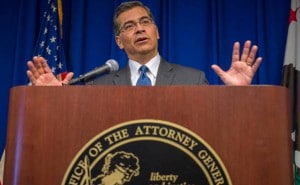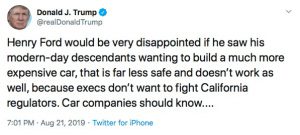The EPA is expected to announce Wednesday afternoon that the Trump administration will eliminate California’s long-held ability to set its own tailpipe emissions standards, a move the state had been planning to use to promote production and sales of battery-electric cars and other zero-emission vehicles.
The White House also plans to revise national fuel economy standards originally set early on under the Obama administration, though it has signaled that the rollback won’t be quite as severe as was originally announced last year. That reflects not only public surveys showing strong support for increased mileage but the unexpectedly tepid response the original cuts proposed for the Corporate Average Fuel Economy, or CAFE, mandate received from the auto industry.
Word that the White House likely would strip California’s unique clean air authority generated an even harsher response. “It’s time to remove your blinders, President Trump, and acknowledge that the only person standing in the way of progress is you,” California Attorney General Xavier Becerra said in a statement Tuesday. “You have no basis and no authority to pull this waiver. We’re ready to fight for a future that you seem unable to comprehend,” Becerra added, warning that the state would take the fight all the way up to the Supreme Court, if necessary.
(Trump Sharpens Focus on California’s Deal with Automakers; DOJ Launches Probe)
The battle over fuel economy standards and California’s own emissions rules could prove to be one of the toughest faced by an administration that has moved aggressively to roll back environmental mandates, especially those set by Pres. Donald Trump’s predecessor Barrack Obama. Among other things, the White House has pulled out of the Paris climate accords, taken steps to promote the use of coal and, over the summer, taken steps to roll back clean water standards.

California Attorney General Xavier Becerra vowed to fight the administration’s attempt to revoke its emissions controls.
Many of those moves have run counter to popular sentiment. The current federal fuel economy rules are particularly popular with the public. A study released by Consumers Union last month found 88% of American adults want improved mileage for all classes of vehicles. Even among those driving some of the least efficient products on the road, pickups and large SUVs, the figure was 73%.
Under a compromise reached during the early days of the Obama administration, fuel economy targets would reach 54.5 mpg by 2025 – though the actual, real-world figure would be closer to the mid-40 mpg range after applying credits and adjustments.
With the growing shift from sedans and coupes to pickups, SUVs and CUVs, automakers were hoping the Obama administration would roll the rules back, a move rejected just before the president left office. But the proposed revisions last year announced jointly by the EPA and the National Highway Traffic Safety Administration – both of which regulate CAFE – received tepid industry support, at best.
(Trump Chides Automakers for Making Deal With California)
There initially appeared to be stronger backing for the Trump Administration’s plan to strip California’s clean air authority. The state has used that to effectively set even stricter targets while also requiring automakers to meet specific targets for the sale of zero-emissions vehicles, including plug-in hybrids, pure battery-electric vehicles and hydrogen cars. Ford officials, for one, had argued that a unified national target would be preferable.
But facing public pressure and concerns about the administration’s approach, Ford was one of four automakers that, in July, reached a deal with the California Air Resources Board, or CARB, that would largely hold to the state’s current emissions and mileage goals, essentially delaying them by about a year.
That compromise reportedly enraged Pres. Donald Trump who quickly tweeted that, “Henry Ford would be very disappointed if he saw his modern-day descendants wanting to build a much more expensive car, that is far less safe and doesn’t work as well, because execs don’t want to fight California regulators.”
Automakers, Ford in particular, have learned to grit their teeth and hold tight when hammered by a presidential tweet. But the administration has gone further this time, the Justice Department announcing that it has launched an anti-trust investigation into the CARB agreement with Ford, Volkswagen, Honda and BMW. That probe, according to industry insiders, has led at least one other automaker to hold off on its own plans to join the agreement.
(Automakers Push Back on Trump Plans to Relax Mileage Rules)
Where the Justice Dept. probe will go is uncertain, but eliminating California’s Clean Air waiver would impact more than just the Golden State. A total of 13 other states, as well as the District of Columbia, have now adopted the tougher emissions mandate. All told, about a third of all U.S. car buyers will be impacted by what the Trump Administration does – and what the courts ultimately decide. a battle, especially if it must eventually be decided by the U.S. Supreme Court, could drag on well past the 2020 elections, legal experts have warned.


Hey, who needs clean air and water and who wants to reverse the effects of climate change when there is profits to be made. Right Trump? (Sarcasm intended)
Trump is so very right. It is time we built cars that people want and that put auto company employees back to work. You get too tough with these companies and then you need to bail them out. Hello Obama.
Uh, you have a timeline issue here. It was a GOP, pro-biz president, GW Bush, who saw the automakers fail. Bush began the bailout process and then handed it over, along with the rest of the economic mess, to Obama…who actually saw the auto industry climb to record levels. I know plenty of executives who’ll tell you the industry hadn’t done better in decades.
If congress passed the Clean Air Act and gave California the authority to have stricter emission rules, how can trump take that authority away? Tho, I feel the loaded SCoTUS will probably give him the authority. After all, every other department is bending to his will.
The admin’s argument is that they can roll back the waiver to set greenhouse gas standards authorized by Obama but won’t touch waivers impacting things like ozone approved by Congress nearly 50 years ago. We’ll see if that plays out in court.
Paul E.